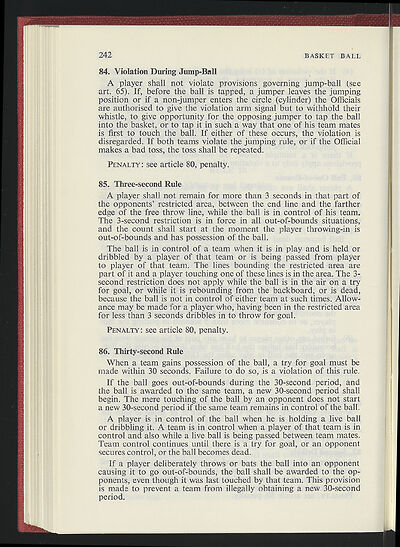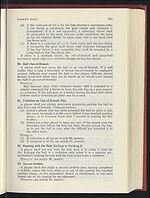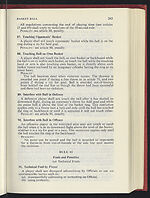1964-65
(268)
Download files
Complete book:
Individual page:
Thumbnail gallery: Grid view | List view

;i
242
BASKET BALL
84. Violation During Jump-Ball
A player shall not violate provisions governing jump-ball (see
art. 65). If, before the ball is tapped, a jumper leaves the jumping
position or if a non jumper enters the circle (cylinder) the Officials
are authorised to give the violation arm signal but to withhold their
whistle, to give opportunity for the opposing jumper to tap the ball
into the basket, or to tap it in such a way that one of his team mates
is first to touch the ball. If either of these occurs, the violation is
disregarded. If both teams violate the jumping rule, or if the Official
makes a bad toss, the toss shall be repeated.
P
ENALTY:
see article 80, penalty.
85. Three
-
second Rule
A player shall not remain for more than 3 seconds in that part of
the opponents' restricted area, between the end line and the farther
edge of the free throw line, while the ball is in control of his team.
The 3-second restriction is in force in all out-of-bounds situations,
and the count shall start at the moment the player throwing-in is
out-of-bounds and has possession of the ball.
The ball is in control of a team when it is in play and is held or
dribbled by a player of that team or is being passed from player
to player of that team. The lines bounding the restricted area are
part of it and a player touching one of these lines is in the area. The 3-
second restriction does not apply while the ball is in the air on a try
for goal, or while it is rebounding from the backboard, or is dead,
because the ball is not in control of either team at such times. Allow-
ance may be made for a player who, having been in the restricted area
for less than 3 seconds dribbles in to throw for goal.
P
ENALTY:
see article 80, penalty.
86. Thirty-second Rule
When a team gains possession of the ball, a try for goal must be
made within 30 seconds. Failure to do so, is a violation of this rule.
If the ball goes out-of-bounds during the 30-second period, and
the ball is awarded to the same team, a new 30-second period shall
begin. The mere touching of the ball by an opponent does not start
a new 30-second period if the same team remains in control of the ball.
A player is in control of the ball when he is holding a live ball
or dribbling it. A team is in control when a player of that team is in
control and also while a live ball is being passed between team mates.
Team control continues until there is a try for goal, or an opponent
secures control, or the ball becomes dead.
If a player deliberately throws or bats the ball into an opponent
causing it to go out-of-bounds, the ball shall be awarded to the op-
ponents, even though it was last touched by that team. This provision
is made to prevent a team from illegally obtaining a new 30-second
period.
242
BASKET BALL
84. Violation During Jump-Ball
A player shall not violate provisions governing jump-ball (see
art. 65). If, before the ball is tapped, a jumper leaves the jumping
position or if a non jumper enters the circle (cylinder) the Officials
are authorised to give the violation arm signal but to withhold their
whistle, to give opportunity for the opposing jumper to tap the ball
into the basket, or to tap it in such a way that one of his team mates
is first to touch the ball. If either of these occurs, the violation is
disregarded. If both teams violate the jumping rule, or if the Official
makes a bad toss, the toss shall be repeated.
P
ENALTY:
see article 80, penalty.
85. Three
-
second Rule
A player shall not remain for more than 3 seconds in that part of
the opponents' restricted area, between the end line and the farther
edge of the free throw line, while the ball is in control of his team.
The 3-second restriction is in force in all out-of-bounds situations,
and the count shall start at the moment the player throwing-in is
out-of-bounds and has possession of the ball.
The ball is in control of a team when it is in play and is held or
dribbled by a player of that team or is being passed from player
to player of that team. The lines bounding the restricted area are
part of it and a player touching one of these lines is in the area. The 3-
second restriction does not apply while the ball is in the air on a try
for goal, or while it is rebounding from the backboard, or is dead,
because the ball is not in control of either team at such times. Allow-
ance may be made for a player who, having been in the restricted area
for less than 3 seconds dribbles in to throw for goal.
P
ENALTY:
see article 80, penalty.
86. Thirty-second Rule
When a team gains possession of the ball, a try for goal must be
made within 30 seconds. Failure to do so, is a violation of this rule.
If the ball goes out-of-bounds during the 30-second period, and
the ball is awarded to the same team, a new 30-second period shall
begin. The mere touching of the ball by an opponent does not start
a new 30-second period if the same team remains in control of the ball.
A player is in control of the ball when he is holding a live ball
or dribbling it. A team is in control when a player of that team is in
control and also while a live ball is being passed between team mates.
Team control continues until there is a try for goal, or an opponent
secures control, or the ball becomes dead.
If a player deliberately throws or bats the ball into an opponent
causing it to go out-of-bounds, the ball shall be awarded to the op-
ponents, even though it was last touched by that team. This provision
is made to prevent a team from illegally obtaining a new 30-second
period.
Set display mode to:
![]() Universal Viewer |
Universal Viewer | ![]() Mirador |
Large image | Transcription
Mirador |
Large image | Transcription
| Games and sports in the army > 1964-65 > (268) |
|---|
| Permanent URL | https://digital.nls.uk/249213720 |
|---|
| Description | 'Games and Sports in the Army' was an annual publication produced by the British War Office between the 1930s and 1960s. This included the Second World War. It outlines the rules and regulations for games and sports played by members of the armed forces. It features names and photographs of team members, and examples of contemporary advertising. |
|---|---|
| Shelfmark | GWB.52 |

